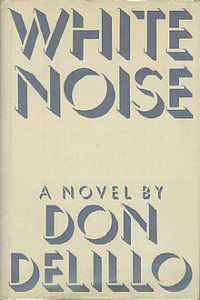Thoughts on White Noise, by Don DeLillo
 This 1985 novel has in some circles been called a postmodern classic. That sent me off on a rumination about what “postmodernism” is. I have understood its most benign definition to be an add-on by modernists to reinforce their commitment to the philosophical uniqueness of the modern age; a way to signal they can’t be caught off guard mired in the suppositions of a reactionary, superseded age. But a less benign definition would incorporate a central truth that there is no meaning to life, other than that central truth. As such, I would expect absurdity to figure prominently in a “postmodern” novel.
This 1985 novel has in some circles been called a postmodern classic. That sent me off on a rumination about what “postmodernism” is. I have understood its most benign definition to be an add-on by modernists to reinforce their commitment to the philosophical uniqueness of the modern age; a way to signal they can’t be caught off guard mired in the suppositions of a reactionary, superseded age. But a less benign definition would incorporate a central truth that there is no meaning to life, other than that central truth. As such, I would expect absurdity to figure prominently in a “postmodern” novel.
White Noise is chock full of situational and entertaining absurdity, but it’s not in service to the meaninglessness paradigm, so I really don’t think “postmodern” fits. There is a point to White Noise; a meaning. I don’t think its meaning is merely that we live out our lives in a never-ending milieu of comical absurdity. There is a point, and it’s not the point that there is no point.
There are scenes in which the author is artistically pointing out our consumer-fashioned existence, such as the repeated grocery store scenes, in which people mill about responding to flashy packaging, waiting in line to check out. In the same way, we wait in line, superficially distracted, to check out of this life. The academics at the book’s generic college do the same thing with intellectual efforts, substituting inconsequential gerbil wheels for real engagement — there is, for example, an entire department devoted to “Hitler studies.”
What are we to take from this? Well, it’s a novel, it’s not necessarily designed to highlight a problem and prescribe a solution. It’s quite sufficient, and good service too, if it only highlights a feature of modern existence that warrants attention. The very fact that we can read it and discern the absurdity means that we have a non-absurd vantage point from which to evaluate it. We know something is missing in our lives if the grocery-store checkout scenario is too chillingly familiar.
I won’t say DeLillo specifically had this mind, but here’s the element that is significant to me. One of the absurdist episodes is that in which the protagonist is being treated in a hospital with Roman Catholic affiliations – the nurses are nuns. He gets into conversation with one of them, which becomes confidential. She says that neither she nor the other nuns actually believe in God/Jesus/miracles/resurrection. The protagonist is scandalized. He feels they should believe. Even if no one else believes, perhaps they would, if they look to the nuns and witness their belief. People are reassured just by the fact that someone believes, even if they don’t. The nun assures him that that’s why they live the lives they do, but it’s the mission of healing illness and accidents that is their real cause. (An existentialist outlook – it put me in mind of Ferdinand de Celine’s Journey to the End of the Night).
Now this isn’t to say that DeLillo is making an apologist pitch. I suspect far from it. But he’s certainly looking at one answer people resort to, in trying to come to terms with their own inevitable demise. The fear of death is the one sure running motif throughout this book. Our anxiety over the certainty of death is not assuaged in the least, if there is no larger point to our existence.
